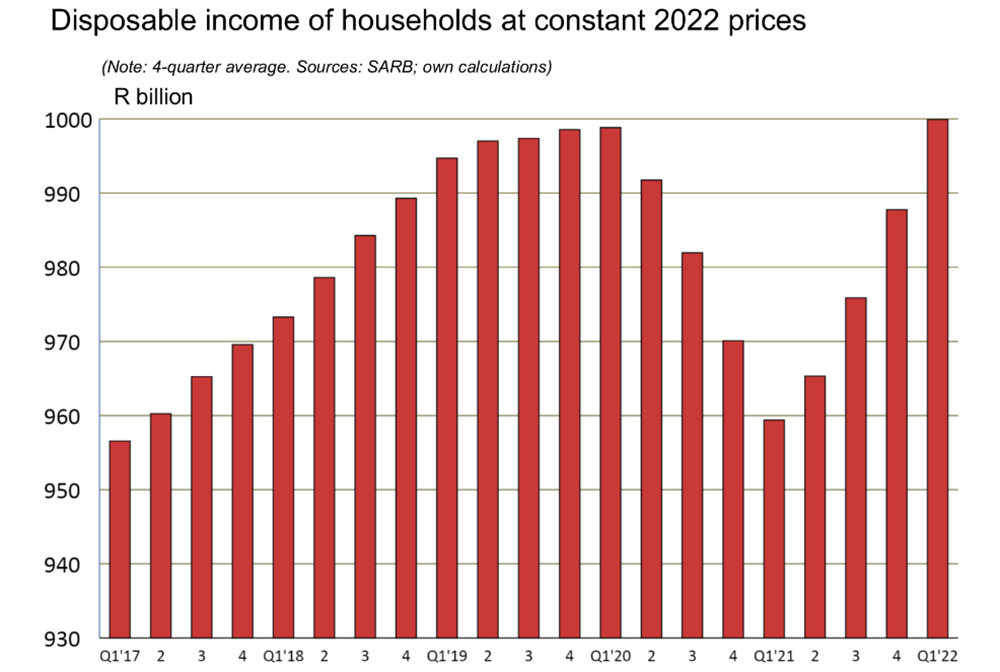Consumer sentiment around the globe has been dealt a blow by the sharp increase in price levels, particularly of fuel and some food products. In South Africa’s case, two other factors have added to high levels of frustration: regular electricity blackouts and rising interest rates (in both nominal and real terms).
No person or business has been able to escape the harsh realities of rolling blackouts, which have been particularly severe since mid-June, while the Reserve Bank has decided (irrationally) to raise the cost of capital in a country that does not have demand-led inflation.
On a micro level, it is quite evident that a tough economic climate exists, but on a macro level, several key indicators still confirm the existence of fundamental economic stability and a growing economy, despite some intimidating headwinds.
Proof of this statement abounds. First, South Africa’s international trade performance keeps on going from strength to strength and continues to break records, most notably the cumulative value of exports during the first five months of the year, which amounted to R791-billion. Furthermore, new vehicle sales in the domestic market increased by more than 7% in June and export sales by 18% (year on year).
A third light in the proverbial tunnel can be found in the latest wholesale trade sales figures, which amounted to more than R260-billion in May — the second-highest ever. Cumulative wholesale sales for the first five months of the year amounted to almost R1.2-trillion, which is a record and 18% higher than in the same period last year. Another economic record that has just been shattered is the value of mining production, which came in at R89-billion in May — 92% higher than the same month in 2019 (pre-Covid).
There is also encouraging news in the latest Altron FinTech Household Resilience Index (Afhri). Although the reading for the first quarter of 2022 was unchanged from a year ago, one of the key components of the index, household disposable income, moved to an all-time record high (in real terms). Positive year-on-year real growth rates were also recorded for salaries in the public and private sectors.
On a year-on-year basis, only six of the 20 indicators that comprise the index recorded declines of more than 1%, a clear indication that a measure of stability has returned to the financial disposition of households.
Unit trusts caught napping
One interesting observation from the Afhri is the poor showing for total unit trust assets (a proxy for one element of household wealth), which declined between the fourth quarter of last year and the first quarter of 2022, despite the record high of the All Share Index (Alsi) on the JSE during early March. On 1 October last year, the Alsi stood at 63,661. Five months later, it had risen by 22% to a record level of 77,536.
Intuitively, one would have expected the total assets of South Africa’s unit trust industry to benefit from this huge increase in equity prices — which is even more impressive when factoring in capitalised dividends. Unfortunately, it seems as if many unit trust fund managers either do not have mandates to switch between asset classes at relatively short notice or they have been rather complacent, knowing that their domestic bond portfolios will deliver close to double-digit returns.
Apart from the sharp increases in fuel prices, the most immediate issue threatening the financial resilience of businesses and households is rolling blackouts. Society at large is piling pressure on the government to address the energy crisis as a matter of urgency and it is encouraging that the National Planning Commission — NPC — (which functions within the Presidency) has recommended drastic steps to ensure the acceleration of renewable energy grid connection.
In the event of the government lifting the 100MW limit for private power generation licensing and simplifying the energy regulation processes (as recommended by the NPC), several thousand megawatts of renewable energy could be introduced into the grid over the short to medium term.
In the interim, the next three months will continue to test the resolve of South Africa’s citizens, but there are insufficient grounds to fear a recession. DM/BM

















 Become an Insider
Become an Insider
SO good to read some good news.